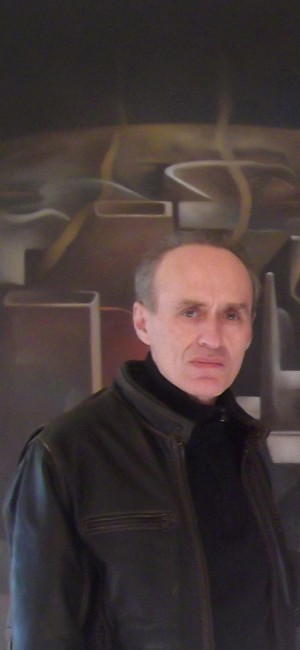Artist Roman Kriheli Transcends Time
GALO: I think that impulse has historically been part of the artistic temperament. When you get your inspiration you may not always know where it comes from, but you want the freedom to express it.
RK: Absolutely. I think art loves freedom.
(Yearning for more freedom, perhaps, Kriheli, his parents and one brother, packed their bags in 1974 and wandered around Israel, followed by several months in Rome and other parts of Northern Italy, before their eventual final move to the States.)
GALO: What do you remember about Israel in terms of the kind of painting you were doing there? There must have been so many different kinds of images.
RK: Yes, it was incredible. Especially for the several months we were living in Safed, which is an ancient city. All the great Kabbalists came from Safed and its incredible nature, very painterly surroundings. I remember one particular painting I did there. The incredible ruins of the houses, it was like a masterpiece, these actual ruins; like a symphony and I did a painting of it. I was so inspired with this image, it took me several days to paint this view, and I forgot it was a Sabbath day. I went in the morning to continue working and all these religious Kabbalistic people came out and started to throw stones. I wasn’t allowed to paint. But I forgot it was the Sabbath.
GALO: I assume they didn’t destroy the painting?
RK: No.
GALO: After Israel, again in the company of your family, you traveled next to Italy. That must have been a real eye-opener. Did you go first to Rome? Is that where the family settled?
RK: Yes. It was amazing. I don’t know how to express with words—all my childhood up to that moment was dreaming to see the great masters of the Renaissance. And all of a sudden I’m in the middle of—I don’t know.
GALO: Something absolutely surreal in a way?
RK: Every step of the way. You see masterpieces, you see unbelievable things.
GALO: I remember the first time I went through the Uffizi Gallery in Florence, and I stepped from that big hallway into one of the rooms, and all of a sudden there was that massive painting about spring by Botticelli.
RK: Primavera.
GALO: Yes, and I had no words.
RK: Incredible painting, so beautiful.
GALO: Did you remain in Rome or did you travel around Italy?
RK: Of course. I was in Venice, Florence, Bologna, a lot of places.
GALO: And so much of the Renaissance painting is concentrated there.
RK: Mostly Florence and Rome. And Venice; Venice is the birthplace of the painting. Most of the early great painting came from that tradition. All the great painters came mostly from Venice. I think Titian was the beginning.
GALO: I was going to ask you who some of your idols were?
RK: Oh, there are so many! Titian jumps out. Michelangelo, Tintoretto.
GALO: Well, you have some of them just a few blocks away at the Metropolitan Museum of Art.
RK: Of course. And when I came here, I was copying some original works in the museum. I even remember the painting I was copying—the Veronese–Venus and Mars. Mars is the god of war.
GALO: When you were in Italy, you must not have been intimidated by your own painting, because when you exhibited at the Palace of Congress you won the first prize and you were a pretty young man at the time.
RK: Yes, I was a teenager. I was 17.
GALO: How was it you were part of such a worldly event at that time? Were you recommended by your teacher at that time?
RK: Actually no. Italians are incredible! The neighbor’s son came over, he was the Minister of Culture at that time in Italy and she, the neighbor, just loved my paintings and she recommended that I participate in this exhibition. I was happy, so happy.
GALO: It must have been a tremendous inspiration at an age like that.
RK: Yes, of course.
GALO: So how many years were you in Italy when you and your family decided to move to the United States? What was the impetus for that move?
RK: Actually that was our intention to come to the U.S. It was just a temporary stay in Italy.
GALO: When you arrived here—we were talking before when we met about the amount of energy you find in New York—it’s a different kind of energy than you find in the Midwest or the South. Your first impressions of being here, tell me a little bit about that.
RK: Of course we came into a new atmosphere—it took time to accept [it].
GALO: In terms of the kind of work you were doing, in Italy, it’s like you’re in another century. There you can have one foot in the new world, and one in the old, but in New York it’s all brash, all about the new. So how did that affect you and your work?
RK: Honestly, I was a little confused, for the first year or so. Physically I was here, but I don’t know how to say this, my mind, my…
GALO: Spirit?
RK: My spirit was looking back. It took me some time to really adjust and to see my surroundings, the reality here.
(Article continued on next page)

